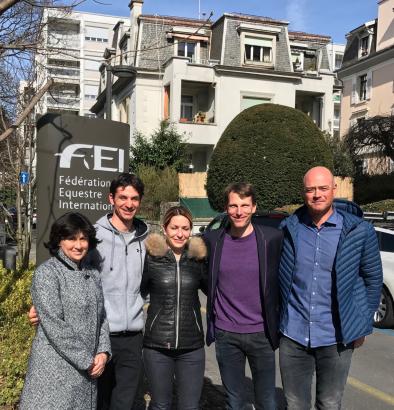On Monday’s meeting in Switzerland, the riders confronted the problems our sport has met with in recent months. During a difficult and turbulent General Assembly in Geneva last December, FEI Secretary General Sabrina Ibáñez proposed that the IJRC should send a delegation to FEI Headquarters early in 2017.
On 20th March 2017 (last Monday), President Ingmar De Vos and 1st Vice President John Madden, who also chairs the FEI Jumping Committee, welcomed IJRC Board members Steve Guerdat (London 2012 Individual Olympic Champion), Kevin Staut (Rio de Janeiro 2016 Team Olympic Champion), Francois Mathy Jnr, IJRC Director Eleonora Ottaviani and european gold medal Swiss Jumping Athlete Clarissa Crotta to the FEI Headquarters in Lausanne.
The FEI was also represented by Maria Gretzer, FEI Executive Board Member and Chair of the FEI Athletes’ Committee, FEI Jumping Director John Roche and Mikael Rentsch, FEI Legal Director.
Main topics on the agenda included the proposals regarding harmonization and the CSI requirement.
The following items were also fully discussed in a positive encounter lasting nearly five hours:
blood disqualifications and proportional of the sanctions as also requested by NARG (North American Riders);
the risk of contamination during events and the resulting potential for adverse analytical findings; the athletes’ representative voting system;
the criteria for National Federations to become members of the FEI and their right to vote. The riders are worried about putting their lives into the hands of NFs that have minimal participation (no horses, no riders). They are also concerned about the impact on their families, breeders, equestrian economies and the hard work of active NFs.
IJRC is certain that the ranking system must be reviewed.
One big item concerns how to make the FEI Nations CupTM more attractive.
The problem of pay cards also came up as did issues surrounding the GCTL (Global Champion Tour and his new team League).
On the latter point, Eleonora Ottaviani commented: “It is important to promote an accessible and healthy sport, with respect for clean rankings.”
Regarding the Global Champions Tour (GCT) and the problem of counting the events of the Global Champions League (GCL), IJRC feels that the gap between the FEI and the IJRC is still quite wide. Two million Euros are required in order to support an A team through the 15 stages of the GCL, yet the FEI is still refusing to talk about pay-cards for this circuit. However, it was agreed to have a meeting exclusively on the ranking system, where we will analyse the reasons for the different problems. The intention of the riders is to do everything in our power to defend the Nations Cups and the ethics of the sport.
Kevin Staut added: “We aim to defend the values of our sport as we love it. Our sport offers irresistible moments, but we live in a world governed by money and politics. Certainly "money" has its good sides. We are not against the Global, we would simply like to defend other circuits and find a healthy balance, to have a sport that is accessible to all, and avoid giving full power to a circuit where financial concerns are very present.”
Some top riders including Kevin Staut, Pénélope Leprévost and Steve Guerdat courageously decided not to compete in the GCL because they prefer to ride their best horses in the CSIO.
However, this will make it virtually impossible to stay in the Top 15 (invited to the GCT).
The London Individual Olympic Champion Steve Guerdat commented on the risk of contamination during an event and the blood rules: “In these two situations the riders feel very anxious, as without any desire to injure on their part, they find themselves under accusation, which has an important impact on the attitude of both the public and the press/media. It is therefore necessary to find a good balance with the FEI Jumping Committee and the FEI Legal Department in order to have fairer rules. It is clear that the horses' welfare comes first, and bad behaviour must be sanctioned, but the sanctions should be differentiated and gradual in function, according to the gravity and intentions behind the violation of rules.”
Eleonora Ottaviani summarized the meeting on the phone while she was returning to the airport: “We were able to talk about everything and that's already positive. The atmosphere was friendly and constructive. We talked very frankly and openly. The riders were able to say everything they thought and all their questions received an answer. We hope now that our relations and exchanges can continue in this positive way. Following the General Assembly in Tokyo, where the new Olympic and World Equestrian Game competition formats were adopted, despite the total disagreement of the riders, the tension was real and we don’t feel a need to hide it. I think we have managed to convince the FEI on a few points; we will see. However we will have to have further discussions at the Sports Forum to present our case on entry fees and rankings. I do not want to go into the details of each other's arguments, because we are negotiating, but we hope to achieve concrete results. This is necessary for the health and future of the sport.”
At the end of this lengthy meeting, Kevin Staut concluded: ”We were able to present our point of view and to speak frankly. It is too early to say what will change and what will not. In any case, I hope that for commitments regarding the blood rule (traces of blood on a side disqualifying a rider) or the real worries of controls of the stables and contamination, and of the well-being of the horses, we will make ourselves heard.”
The next debates, this time open to the public and press, will take place on April 10th and 11th in Lausanne-Ouchy, during the FEI Sports Forum.
PM






























